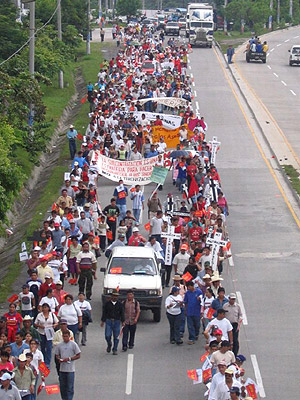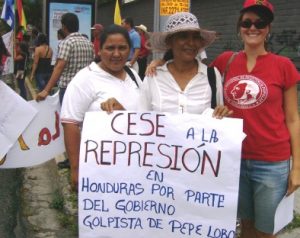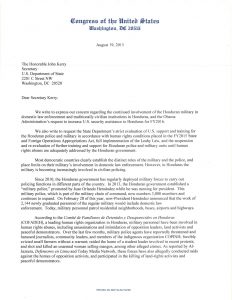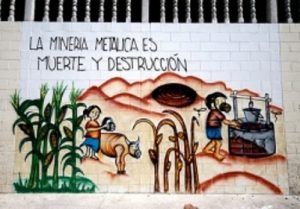Human Rights, Migration, Online Resources
Human Rights Update: October, 2006
Agreement of Constitution for the Social Coordination for Human Rights
The Salvadoran population in its majority is marginalized socially and economically; El Salvador’s economy is stalled and concentration of wealth is increasing, salaries are low and unemployment is rising, we lack our own currency and inflation is on a rampage and we have a very serious financial deficit. In this reality thousands of people, mostly women, have been fired from textile factories, maquiladoras, and workers in the public sector have had similar luck.
This situation is made worse by a constant rise in the cost of living: an increase in fuel costs, electricity and potable water, as well as public transportation and basic goods, medicines and health services in general.
The historical violation of social, economic and cultural rights has deepened; the affected population finds social protest to be the only way to demand better life conditions and respect for their own human rights.
The targeting of our environment and transgressions against our historic and cultural values reveal that the actual ruling sector considers our country to be a motherland with no borders other than their own interests. The scarcity of water, clean air, and topsoil as well as the contamination of our rivers doesn’t seem to be a worry for those who make the country’s decisions. Subcultures and Machismo are promoted, and there is no interest taken to build an informed and critical population.
The country is in the midst of a reversal of civil rights; in the rural as well as urban areas leaders, men and women, are being arbitrarily captured and held, principally young people; the nucleus of personal and civil liberties is being violated on a daily basis. Moreover, political rights are gravely at risk: political electoral campaigns run permanently generate an environment of uncertainty and insecurity. We are conditioned to vote out of fear. There is an irreverent manipulation of ideological freedom and personal autonomy. This is a new way of violating the purity of electoral processes.
El Salvador is today one of the most insecure countries of Latin America. In the first 6 months of 2006 the National Civilian Police force recorded 1830 homicides, 92 more than in the same period of the previous year. The occurrence of arbitrary and extra-judicial assassinations is indisputable, and the responsible authorities do not investigate the cases in depth; in this reality the victims are most often women, children and youth. In the last 3 years the criminality directed towards women has risen, according to a study of the press in 2003 77 assassinations of women were recorded, which subsequently rose to 190 cases in 2005. The levels of violence against women have risen without a corresponding consideration on the part of security programs that considers them as subjects of aggression and crime.
The “combat against delinquency” that is based on campaigns of law and order, begun in July of 2003 with the Strong Hand Plan, is shown to be ephemeral and unsustainable, with an impact that is almost exclusively symbolic and geared toward the media. The insistence on this plan despite the daily proof of its inefficiency to contain social violence has created protest out of certain sectors toward the authorities against the state of violence and criminality, and demanding real and effective solutions to the problem.
Each passing day shows clear evidence that there is no willingness from the government to take adequate measures to confront this reality; its insistence in exclusively repressive measures and legal reforms, agains the growing criminality, adds an additional ingredient of uncertainty and this fear has taken the population captive, especially the poorest sectors who, again, are the most deeply affected.
This reality is aggravated by the non-functioning institutions of the State and its laws; the disrespect for the separation of powers, a fundamental pillar of democracy which has been kidnapped by the a sense of factitious presidential power, thus annulling the rule of law. The Legislative Assembly (Congress), the Attorney General’s Office, Department of Human Services, the controlling body of the Supreme Court, and the Supreme Electoral Tribunal respond without a doubt to the orientation given by the Executive Branch, and the Executive, in turn, responds to the interests of a small group that controls the economy and the market, actively receiving benefits from trade agreements, globalization, and the so-called trade openness.
The Judicial Branch presents a double scenario: Some local and federal circuit judges as well as Supreme Court Justices make an effort to fulfill their duty and are guided by the Constitution and national Law, while others act with complacency and connivance toward growing authoritarianism and violation of the Constitution and international human rights treaties; those who uphold the constitution are becoming the object of disrespect, threats and exclusion. Judicial independence is one of the checks and balances must under fire from the Executive power.
We call attention to the role that some of the media is playing, putting aside ethical principles of journalism and using practices such as the manipulation of information and deficiency in investigative journalism, thusly denying the public the possibility of having information and options to create a correct analysis of the national reality and therefore the right to the truth.
This reality, generated without a doubt by the economic system, provokes a force that expels the Salvadoran population from its home, obliging them to emígrate, principally to the United Status, where they send home remittances to their family members still living in the country. This incurs high human costs taken on by the immigrant population, victim of physical and psychological aggressions, as well as the disintegration of Salvadoran families, discrimination in the U.S. and other effects of a process of transculturation.
Family remittances have kept the Salvadoran economy from plummeting completely; that is, to keep the economy functioning thousands of Salvadoran men and women must leave the country, and many must die along the way.
The country is in the midst of a very delicate moment. Now 15 years alter signing the Peace Accord and an official transition, the accords themselves have not been satisfactorily fulfilled for the majority of the population. What we have now is an electoral representative democracy that does nothing to combat the structural causes that were at the base of the war; on the contrary the hegemonic block of th ruling party, business elite and conservative sectors has been reinforced and maintains ideological, political and economic dominance, enforcing an exclusive and oppressive system.




